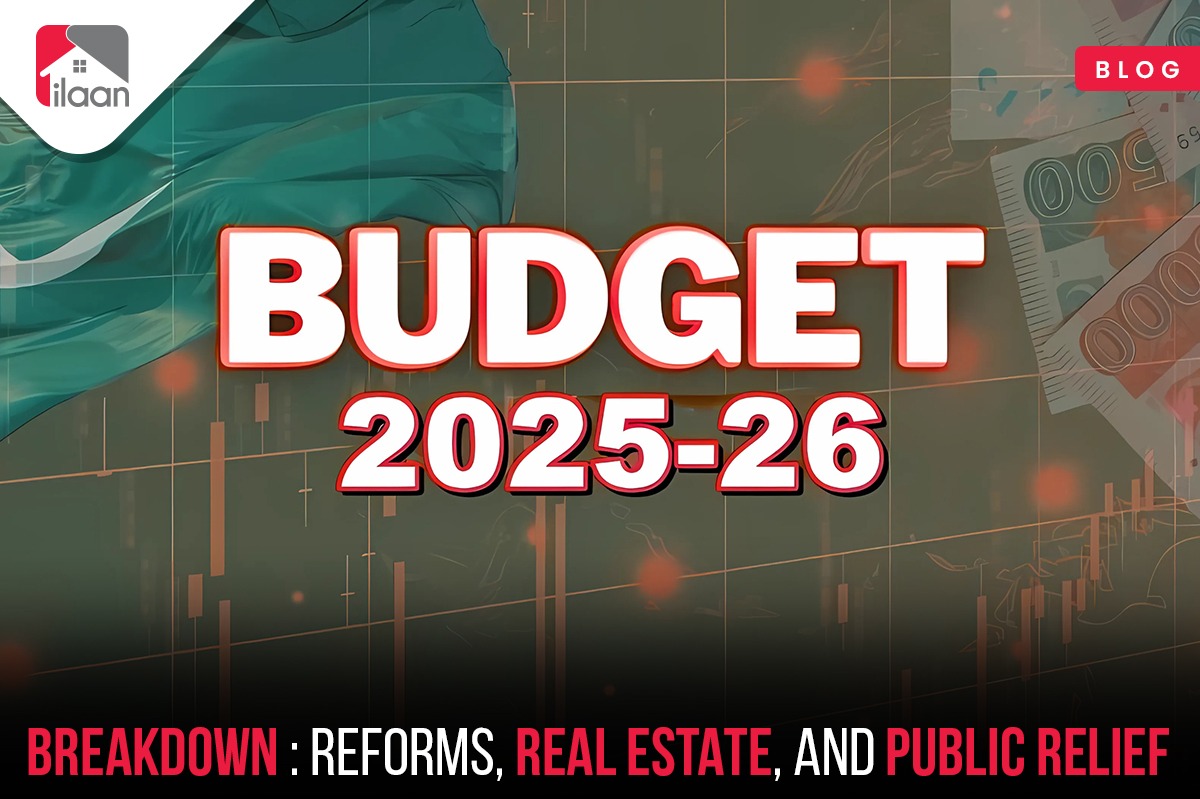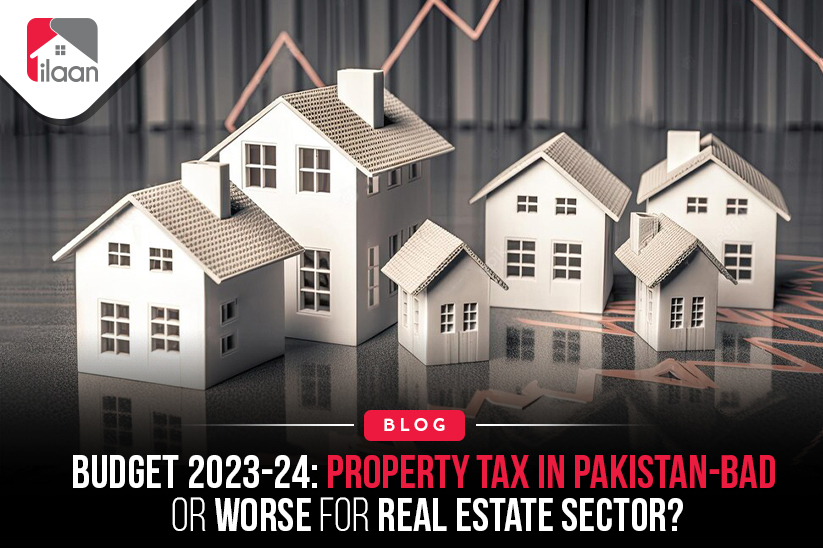Budget 2023-24: Property Tax in Pakistan-Bad Worse for Real Estate Sector?
General Knowledge
09 Aug 2023
Throughout the past few years, Pakistan's real estate market has experienced substantial growth. Property ownership has grown to be a significant source of income for many individuals and families as a result of urbanization and the expansion of cities.
Throughout the past few years, Pakistan's real estate market has experienced a downfall. Property ownership has grown to be a significant source of income for many individuals and families as a result of urbanization and the expansion of cities.
The duty of paying taxes, however, comes along with property ownership. One of the main sources of income for the Pakistani government is the property tax. In this post, we'll go through the present property tax situation in Pakistan for the 2023–2024 fiscal year, covering the FBR tax and the property tax computation procedure and either good or bad for the real estate sector.
The Government of Pakistan has made various adjustments to the taxation rules about the real estate sector in the Budget 2023–24, which was announced through the Budget Speech 2023–24. The segmentation is intended to encourage investment in some real estate market sectors while discouraging it in others.
The final goal of this article is to debate whether it is bad or worse for the real estate industry. Real estate is already facing a downfall with the high rising of inflation. Let’s understand with the help of the current federal budget of Pakistan which is directed by the ministry budget speech 2023-24 in Pakistan.
What is Property tax in Pakistan?
According to the provincial Urban Immovable Property Tax Act, property taxes in Pakistan are provincial levies based on the annual rental value of the property. Every province has a distinct tax rate. Either a flat fee or a portion of the annual rental value applies. It merely provides the government's assessment of the rent that would have been paid had the building been rented out. Whether a property is rented out or used for personal usage affects the tax rate in each province.
Note: As per the rule, Zakat is not considered a Property Tax. Both are considered Separate entities.
Tax Calculation on Rental Value in Punjab
The Excise, Taxation & Narcotics Control Department of Punjab states that there is a 5% yearly rental value tax on all the properties rented out to gain rental income. All the properties that fall in this category are evaluated according to their land area, property size, and type of property (residential or commercial). It is also considered that either the properties are completely rented out or partially, i.e., one portion is occupied by the owners and the other is rented out.
Tax Calculation on Rental Value in Sindh
Every property in Sindh
No matter whether the property is rented out or not, the Excise, Taxes & Narcotics Department of Sindh says it is still subject to taxation. The tax is assessed at a rate of 25% of the property's annual rental value.
Latest Update 2023: New Tax Rates Implemented on Real Estate Transactions in Punjab
|
“In the past, if you purchased any property in Punjab, then, according to the Tax calculations, Filers had to pay a 3% fee, while non-Filer had to pay a 7% levy”. Resource by Punjab Land Record Authority (PLRA) 2023! |
Budget Highlights for Sale of Property - Capital Gain Tax (CGT) Revision
The profit made from the sale of a capital asset is subject to Capital Gain Tax – CGT. The government changed the CGT and its effects on all three types of real estate sectors in Budget 2023–24. The following are the new capital gain tax rates:
- 5% in the plots and files sector
- 10% in the construction sector
- 15% High-rise housing
Capital Gain Tax - CGT Calculations for Plot and Plot Files Only
The people who are in the field of buying and selling plots and plot files must consider the terms defined in the budget for CGT. These CGT calculations imply from the first year till the sixth year of holding the plot for sale or plot file with different tax brackets. Here is the table to understand better.
| Property Type | Holding Period | Capital Gain Tax Rate |
| Plots and Files sector | Up to 1 year | 15% |
| 1 to 2 years | 12.5% | |
| 2 to 3 years | 10% | |
| 3 to 4 years | 7.5% | |
| 4 to 5 years | 5% | |
| 5-6 years | 2.5% | |
| More than 6 years | Exempt |
Read More: Scam Using Plot Files in Pakistan
Capital Gain Tax - CGT Calculations for Houses & Build Properties Only
If you purchase a house or build property and hold it for 4 years and then sell it, this property will be considered exempt from CGT. This tax implies from the first year of selling your particular property till the fourth year with different calculation brackets. Below are the details.
| Property Type | Holding Period | Capital Gain Tax Rate |
| Houses | Up to 1 year | 15% |
| 1 to 2 years | 10% | |
| 2 to 3 years | 7.5% | |
| 3 to 4 years | 5% | |
| More than 4 years | Exempt |
Capital Gain Tax - CGT Calculations for Apartments & Highrise Only
These CGT calculations imply from the first year till the two years of holding the apartments for sale with different tax brackets. Here is the table to understand better.
| Property Type | Holding Period | Capital Gain Tax Rate |
| Apartments | Up to 1 year | 15% |
| 1 to 2 years | 7.5% | |
| More than 2 years | Exempt |
Capital Gain Tax (CGT) Rates for Residential, Commercial, and Agricultural Lands for 2023
The tax rates that are applied to various kinds of real estate transactions must be adjusted as a result of the capital gain tax revision. The new rates seek to strike a compromise between promoting investment and making sure that the right amount of tax is paid. The new capital gain tax rates for various property kinds are shown in the table below:
| Property Type | Holding Period | Capital Gain Tax Rate |
| Residential Property | Up to 1 year | 10% |
| 1 to 2 years | 7.5% | |
| 2 to 3 years | 5% | |
| More than 3 years | Exempt | |
| Commercial Property | Up to 1 year | 15% |
| 1 to 2 years | 10% | |
| 2 to 3 years | 7.5% | |
| More than 3 years | Exempt | |
| Agricultural Land | Up to 1 year | 20% |
| 1 to 2 years | 15% | |
| 2 to 3 years | 10% | |
| More than 3 years | Exempt |
What is the Federal Board of Revenue - FBR Property tax in Pakistan?
In Pakistan, the Federal Board of Revenue (FBR) is the main government body in charge of collecting property taxes. According to the rental value of their properties, property owners must annually pay the property tax to the FBR.
The FBR has developed a system for determining property taxes that take into consideration details like the property's size and location. Property taxes may be paid by the Owner in person while visiting the FBR Office in the nearby locality. For convenience people who are unable to visit the FBR office can pay their taxes online at the FBR's official website.
How is property tax calculated by the FBR in Pakistan?
FBR uses a structured approach to calculate the property tax figure. It is based on the properties’ rental value, here are the formulae.
Property Tax = (Rental Value of Property x Tax Rate) / 100
In the above calculation criteria, Tax Rate varies as per the type of property i.e., residential, commercial, industrial, and Agricultural. It ranges from 2% to 5%.
Property Tax in Pakistan: Is Good or Bad for Real Estate Sector?
In Pakistan, people commonly purchase property for two purposes, one is to gain financial benefits to run their life by renting out the property or selling it when funds are required. People utilized their entire lifelong savings and invested in real estate considering it a safe investment. Such people do not have any financial backup to recover their losses if any fraud happens. These people are mostly retired, widowed, and old citizens of Pakistan or middle-class people who believe that their house of the main investment they made.
Other types of people are the investors who buy property and leave for a certain time to gain financial benefits. They are rich in affording capacity. Some of them are not interested in renting out the property for financial reasons but they do it for its maintenance. Some of them have purchased real estate and rented out them like businesses to gain benefits.
After this budget is released, people have mixed opinions about the increase in the taxes imposed on the real estate sector. One group is in support of such an increase in the budget considering it as a major need of the time to support the declining economy of Pakistan. On the other hand, a group of people opposed the increase in taxes considering it a big burden on the shoulders of the people.
The discussion regarding the introduction of property taxes in Pakistan for the year 2023–24 budget is a complicated one that calls for a careful examination of its potential effects on the real estate industry as well as its compliance with legal requirements and social rights. Here are the advantages and disadvantages of the property tax in Pakistan.
Advantages of Property Tax in Pakistan
- Property taxes are a major source of money for the government, which is then used to fund things like building infrastructure, educating children, and providing healthcare. This might result in general living circumstances getting better.
- Property taxes target property owners, particularly those with several properties or high-value holdings, to redistribute wealth. As a result, there is less wealth disparity, and society as a whole is more egalitarian.
- Implementing property taxes discourages speculative real estate investment. Excessive levels of speculation cause artificial price inflation, which reduces the affordability of property for regular people.
Disadvantages of Property Tax in Pakistan
- Middle-class homeowners who used a large percentage of their funds to buy a home may be disproportionately impacted by property taxes. Financial hardship could emerge from the burden of higher taxes, especially for people on fixed incomes.
- As buyers and investors weigh the increased financial burden, property taxes may temporarily cause the real estate market to slow down. Construction, associated businesses, and job generation may all suffer as a result.
- A reliable system for property valuation and tax collection is necessary for the efficient application of property taxes. It is difficult to build an effective tax collection system in a nation like Pakistan where corruption and informality are pervasive.
Conclusion
To navigate Pakistan's property tax system for the fiscal year 2022–2023, one must be aware of the most recent tax rates, incentives, and rules. The government's emphasis on the building industry offers fresh prospects for real estate developers. Property owners and investors can benefit from their investments while also contributing to the nation's revenue by being informed and adhering to tax regulations.
Real estate purchasers, sellers, and investors must comprehend the new Capital Gain Tax structure. The suitable tax rate can be calculated with the use of categories for different types of property and holding times.
The team at ilaan.com took the privilege of this opportunity to provide the public with more authentic information regarding these general queries.
If you have any suggestions, please do not hesitate to comment.
Recent Blog

10 Smart & Simple Tricks to Cool Your Home Th...
29 Jun 2025

Budget 2025-26 Breakdown: Reforms, Real Estat...
25 Jun 2025

How to Stay Safe on Your Northern Getaway Whi...
14 Jun 2025

Top 7 Online Qurbani Services in Pakistan for...
29 May 2025





